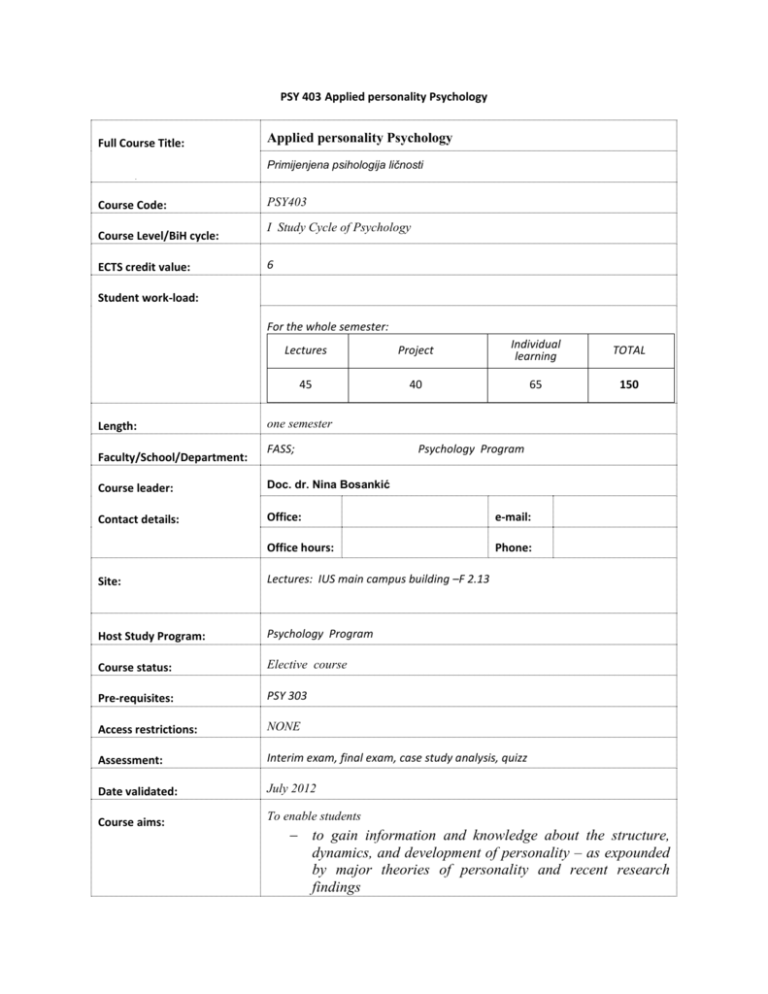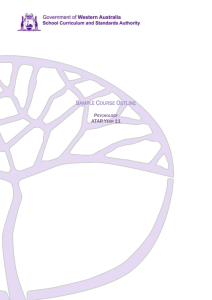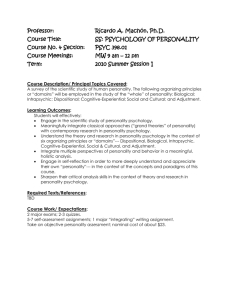PSY 403 Applied personality Psychology
advertisement

PSY 403 Applied personality Psychology Full Course Title: Applied personality Psychology Primijenjena psihologija ličnosti Course Code: Course Level/BiH cycle: ECTS credit value: PSY403 I Study Cycle of Psychology 6 Student work-load: For the whole semester: Length: Faculty/School/Department: Lectures Project Individual learning TOTAL 45 40 65 150 one semester FASS; Psychology Program Course leader: Doc. dr. Nina Bosankić Contact details: Office: e-mail: Office hours: Phone: Site: Lectures: IUS main campus building –F 2.13 Host Study Program: Psychology Program Course status: Elective course Pre-requisites: PSY 303 Access restrictions: NONE Assessment: Interim exam, final exam, case study analysis, quizz Date validated: July 2012 Course aims: To enable students to gain information and knowledge about the structure, dynamics, and development of personality – as expounded by major theories of personality and recent research findings to see the links between personality psychology (as a central psychological discipline) with other disciplines of psychology and other scientific fields to enable students to synthesise, compare and evaluate these theories in light of contemporary research to learn about the key theorists and the historical context in which the field developed. the field of biological psychology and to gain insight into the methods relevant for this field Learning outcomes: Indicative syllabus content: On successful completion of this module the student will be able to: use a great deal of terms developed in the field of personality psychology, apply the acquired knowledge to analyse cases in terms of major personality theories address the issues of human psychological development and of psychological adjustment from the viewpoint of personality processes understand the use of various data collection methods and research procedures or their variants specific to personality psychology, understand the meaning and range of human variation with regard to psychological processes and phenomena, understand the significance and use of principles and techniques of personality psychology in applied fields, such as clinical work or human resource management, as attempts to predict behaviour from the perspective of behavioural consistency, understand the limitations of knowledge in predicting and controling human behaviour. This course is the continuation of the Personality Psychology course. The emphasis of the course is to explore the existent diversity of personality theories and approaches of a number of psychologists in detail by contrasting and comparing the issues that divide personality theorists (i.e. internal and external causes of behaviour, the unity of behaviour and the concept of the self, varying states of awareness and the concept of the unconscious, relations among cognition, affect, and overt behaviour, influences of the past, present and future on behaviour etc), by providing an overview of the concepts that each theory uses to explain the what, how and why of human behaviour (personality structure, process, growth, development, pathology and change), and finally by taking into consideration the relation among theory, assessment and research. Students will be given the opportunity to learn about the distinctive contributions each theory makes toward a more completeto child and adolescent disorders.Understanding of human personality. Learning delivery: Teaching occurs via lectures, seminars and tutorials, individual and team- work in-class activities Assessment Rationale: In order to provide solid undergraduate foundation in Psychology program and to enable students to develop a critical and evaluative understanding of personality psychology, students are expected to demonstrate commitment and diligence at any time whichever module they take, therefore appropriate assessment methods to help students to stay focused and active, and fully benefit from the Program include interim exam, final exam, case study analysis, quiz . Assessment Weighting: Essential Reading: Recommended readings: Quiz 10% Interim exam 30%, Case study analysis 20% Final exam 40% McAdams, D. P. (2006). The Person: A New Introduction to Personality Psychology(4thed.). New YorK : John Wiley & Sons. Westen, D. (1985). Self and Society: Narcissism, Collectivism, and the Development of Morals. Cambridge, Eng.: Cambridge University Press. Funder, D.C. (2010). The Personality Puzzle (5th edition). NY: W.W. Norton and Company. Cervone D., Pervin, L. A. (2008). Personality: Theory and Research (10 th edition). New York: John Wiley and Sons, Inc. Brody, N., Ehrlichman, H. (1998). Personality and evolution. Upper Saddle River, NJ: Prentice Hall Intranet web reference: N/A Important notes: Expected knowledge of: 1. Basic Psychological terminology 2. Basic understanding of biological bases of psychology Course policies: Assignments: Each student should complete their assignment in certain time. According to the assignment students take help from the lecturer on his office hours. Lateness in Assignments: The due date and time for each homework assignment will be specified on the assignment handout itself. Late assignments will not be accepted. Academic Integrity: Any cheating on examinations or quizzes or offering the work of another as one's own in an assignment is regarded as a serious offence to the academic integrity and will lead to a ZERO for the assignment grade, or serious disciplinary actions, including possible suspension. Collaboration in Assignments: Students are encouraged to work together on homework assignments, to the extent that it helps promote a productive learning environment for all those involved. However each student must write his/her own solutions. Copied homework is graded with ZERO. Important dates: Midterm exam : Interim exam : Final exam: Quality assurance: Student surveys, discussion on course, student appeals, e-mails, direct (formal) feedback at the end of the semester by students, assistants and other colleagues







